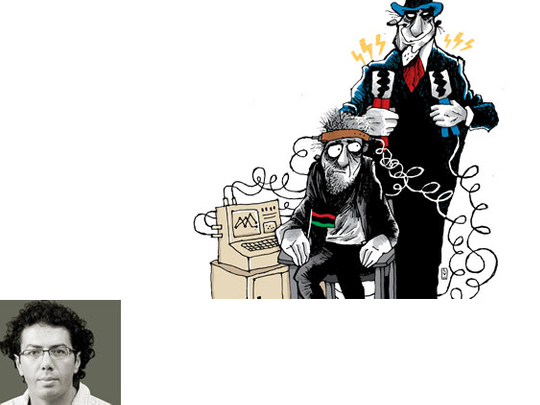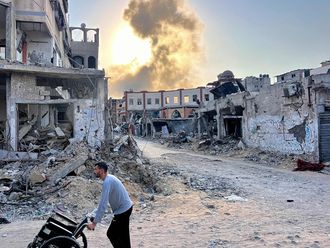
Shortly before committing suicide in 1961, the American author Ernest Hemingway wrote about his electroshock therapy. "Well, what is the sense of ruining my head and erasing my memory, which is my capital, and putting me out of business? It was a brilliant cure but we lost the patient."
This line was quoted by Naomi Klein in The Shock Doctrine: The Rise of Disaster Capitalism. Klein's book was a major contribution to our understanding of how western countries, led by the US, facilitated or took advantage of major disasters to attain domination over vulnerable and politically disjointed countries around the world. In the chapter entitled, "Erasing Iraq: In Search for a ‘Model' for the Middle East," Klein describes the attempt at destroying and then resurrecting the country to fit the mould sought by those who administered its fall. She concluded Part 6 with the following statement: "So in the end, the war in Iraq did create a model economy…it was a model for privatised war and reconstruction — a model that quickly became export ready."
The US had commenced its war on Iraq in 2003, with the ‘Shock and Awe' bombing campaign. The aim was to disorient not only Saddam Hussain, but Iraqi society as a whole. It was assumed that in the face of such firepower, no Iraqi group would dare challenge their new rulers. We all know now how wrong they were. The fact that the shock therapists are currently negotiating the terms of their withdrawal only confirms that the shock doctrine will eventually fail. Instead of ‘curing the patient' — as if this was ever its true intention — it reverberates into series of crises that extend beyond the boundaries of the operation.
Yet, somehow the Iraq ‘model' is still being exported, and the current victim in this dismal saga is Libya.
What began in Libya as peaceful protests on February 15 soon descended into civil war between warring parties, each posturing as the true saviour of the Libyan people. A National Transitional Council (NTC), mostly made of defectors from Gaddafi's regime, claimed to represent all Libyans. Of course they possessed no such mandate, except for the quick validation bestowed upon them by the North Atlantic Treaty Organisation (Nato). The Libyan army was perhaps confident that their superior firepower and Muammar Gaddafi's connections with the Nato members that supported the NTC would guarantee the outcome of the battle in its favour.
But Nato had different calculations. First, the so-called Arab Spring has changed the enduring paradigm in the Middle East, where major geopolitical shifts are often determined by external factors. This gives the US and its allies room to initiate policies, as opposed to responding to crises. Second, as explained by Klein, crises can quickly become opportunities for ‘humanitarian' interventions, allowing western powers to construct post-crisis scenarios to suit their interests. In Iraq, no-fly zones over northern and southern Iraq were declared by the US, Britain and France after the 1991 war. They were based on a questionable interpretation of UN Security Council resolution 668. The parameters of the no-fly zones mission eventually extended to mean all-out war in 2003. Also, the reasoning behind that intervention changed accordingly.
In Libya, the scenario was similar, but time was of the essence. The near-bankrupt Nato countries that had initiated the war against a former ally understood that the public mood in their countries would not support a costly and prolonged military intervention. Thus, unlike Iraq, it took Nato a matter of days to interpret UNSC resolution 1973 — authorising ‘All necessary measures' to protect civilians — to mean regime change in Libya.
From Nato's standpoint, overt and covert operations would produce faster and more satisfying results in Libya than years of sanctions, air strikes, debates about UN resolutions and eventually a full-scale invasion. Nato's behaviour in Libya seemed to be controlled by a greater sense of urgency than had been the case with Iraq. And still, there were glaring commonalities. Libya was Iraq, shocked and awed repeatedly, Sirte was Fallujah and Saddam hanging from a rope was a bloodied and dying Gaddafi in the back of a truck.
In her visit to the ‘soil of free Libya' on October 18, US Secretary of State Hillary Clinton hoped that Gaddafi would soon be captured or killed. The anticipation was reiterated by British and French officials, all seemingly eager to transition from an era of dictatorship to one of democracy. But security chaos, which has already taken hold in Tripoli, seems the most likely fate awaiting the ‘new Libya'. Libya's interim leader has put forward the option of incorporating Libya's fighters into the army or private security contractors. As for rebuilding, this will also follow Iraq's example. The mission will be entrusted to those Nato members credited with ‘liberating' Libyans.
Rightwing US Senators including John McCain wrote this on Libya in the Wall Street Journal: "What remains is an enormous opportunity for the US to build a partnership with a democratic and pro-American Libya that contributes to the expansion of security, prosperity and freedom across a pivotal region at a time of revolutionary change."
The shock therapists are still applying their horrifying treatment to another victim. The future of Libya is now as uncertain as that of Iraq. And still, as with Iraq, this does not mean the treatment will succeed. As Ernest Hemingway once wrote, "A man can be destroyed but not defeated."
Ramzy Baroud is the editor of PalestineChronicle.com. He taught Mass Communication at Australia's Curtin University of Technology. His latest book is My Father Was a Freedom Fighter: Gaza's Untold Story.








